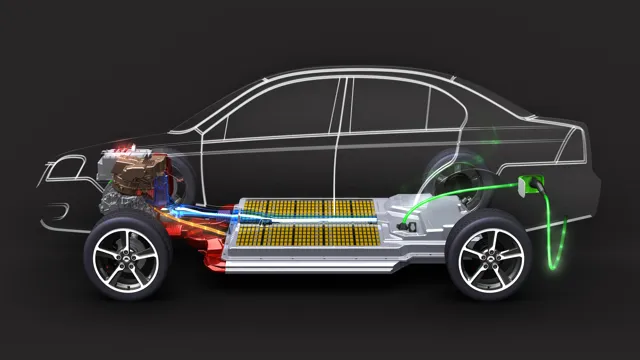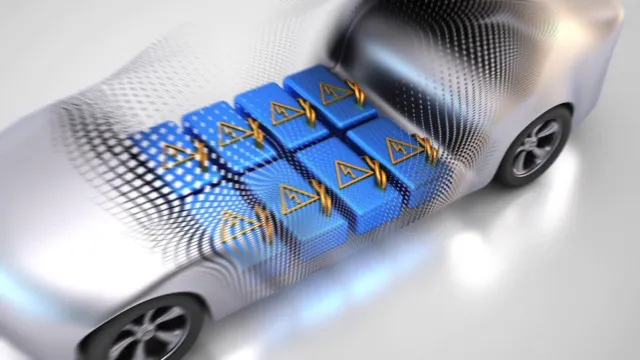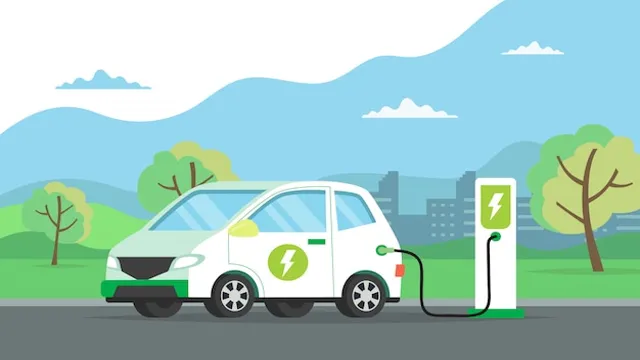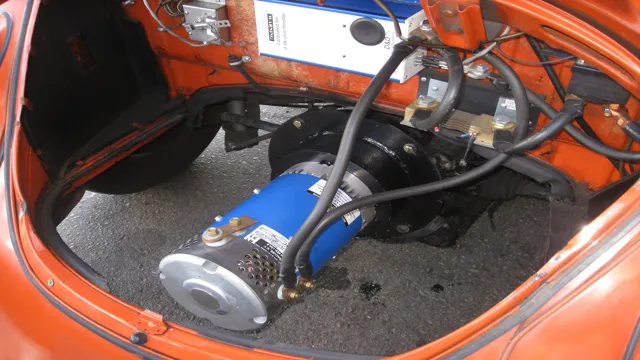Powering the Future: Batteries and Electric Cars Explained
Electric cars have become increasingly popular in recent years as we strive towards achieving a sustainable future. One of the most significant factors driving the success of these cars is their batteries. It’s no secret that batteries play an essential role in making electric cars functional, but the full extent of their power is often overlooked.
Batteries are the heart of an electric car and are responsible for everything from powering the engine to running the air conditioning system. Think of batteries in electric cars as the fuel tank in a traditional car; they’re what keeps the vehicle moving. Without batteries, electric cars would simply be inoperable.
Not only do batteries keep electric cars running, but they’re also designed to deliver an impressive range that is often underestimated. With new advancements in battery technology, we’re seeing ranges that exceed 300 miles on a single charge, making long-distance travel a reality for electric car owners. The power of batteries in electric cars extends beyond the convenience of not having to fuel up at a gas station.
Electric vehicles produce significantly less harmful emissions than their gasoline counterparts, making them a more environmentally friendly option. The sustainability factor is further boosted by the fact that most batteries in electric cars are now recyclable. This means that the resources used to create the batteries can be repurposed, providing a more sustainable solution for the future.
As we continue to progress towards a world that relies more heavily on electric vehicles, the power of batteries will only continue to grow. It’s an exciting time for sustainable transportation, and the future looks bright with advancing battery technology. By acknowledging the significance of batteries in electric cars, we can better appreciate the revolutionary impact they have on our environment and daily lives.
Battery Technology: Lithium-Ion vs. Nickel-Metal Hydride
When it comes to batteries in electric cars, there are two main types: Lithium-Ion and Nickel-Metal Hydride. Lithium-Ion batteries are the more popular choice due to their higher energy density and longer lifespan. They also charge faster than Nickel-Metal Hydride batteries and can hold their charge for longer periods of time.
However, they are more expensive to produce and can be a fire hazard if not handled properly. Nickel-Metal Hydride batteries, on the other hand, are cheaper to produce and are less likely to catch fire. They have a lower energy density, meaning they will need to be recharged more frequently, and they also have a shorter lifespan.
Ultimately, the choice between these two battery types will depend on the specific needs of the electric car and its user. But as electric cars become more popular, it’s clear that battery technology will continue to improve, leading to better performance and longer lifespans for both Lithium-Ion and Nickel-Metal Hydride batteries.
Comparing the pros and cons of these battery types
When it comes to batteries, the two most common types are lithium-ion and nickel-metal hydride. Each has its own set of pros and cons. Lithium-ion batteries are known for their high energy density, making them great for devices that require a lot of power, like smartphones or laptops.
Additionally, they have no memory effect, which means that they can be charged at any time without affecting battery life. However, they are more expensive to manufacture and have a shorter lifespan than nickel-metal hydride batteries. On the other hand, nickel-metal hydride batteries are less expensive and have a longer lifespan, making them an excellent choice for devices like remote controls or flashlights.
However, they have a lower energy density, which means they don’t provide as much power as lithium-ion batteries. Ultimately, when choosing between these two battery types, it’s essential to consider the specific requirements of your device and your budget.

How these batteries impact the range and performance of electric cars
When it comes to electric cars, the battery technology used plays a vital role in determining their range and performance. Lithium-ion and nickel-metal hydride are two of the most commonly used types of batteries in electric cars. Lithium-ion batteries are the most popular due to their high energy density, longer life span, and lighter weight.
They are also highly customizable, making them suitable for different types of electric cars. On the other hand, nickel-metal hydride batteries are cheaper and safer than lithium-ion batteries. However, they have a lower energy density, are heavier, and have a shorter lifespan.
It’s essential to consider the type of battery used when purchasing an electric car as it will impact the vehicle’s range, performance, and overall cost. When it comes to battery technology, lithium-ion batteries are the way to go for optimal performance, despite their slightly higher cost. With their high energy density and longer lifespan, lithium-ion batteries provide a powerful and reliable source of energy for electric cars, making them the ideal choice for eco-conscious motoring.
Solving the Battery Life Challenge
Batteries and electric cars have become a popular topic in recent years as the world seeks to reduce its carbon footprint and look for alternative ways to power vehicles. One of the biggest challenges in this quest for a more sustainable mode of transport is the battery life of electric cars. While the technology has come a long way, modern batteries still have limited capacity and require frequent recharging.
This has led to ‘range anxiety’ for electric car owners who worry about running out of power during long journeys. However, various solutions are being explored to combat this issue. Improvements in battery technology, such as solid-state batteries, promise to increase battery life significantly.
Additionally, charging infrastructure is being developed to make charging electric cars convenient and fast, further reducing the fear of being stranded. Batteries and electric cars are still in their infancy, but with continued innovation, there’s no doubt that these vehicles present a sustainable future for transportation.
Innovative solutions for extending the life of electric car batteries
Electric car batteries are a crucial component for making electric vehicles a viable mode of transport. However, the challenge of extending the life of these batteries has been a topic of much debate in the industry. Innovative solutions are coming to the forefront to address this issue and improve the longevity of electric car batteries.
One such solution is using artificial intelligence to optimize battery usage, which can significantly increase battery life. Another innovative approach is developing solid-state batteries, which improve energy density and reduce the risk of fire. Additionally, recycling and repurposing old batteries are being explored, which not only helps to reduce waste but also provides an economical and sustainable solution for battery life extension.
These innovative solutions hold the key to solving the battery life challenge and making electric vehicles more accessible and sustainable for consumers.
The role of charging infrastructure and regenerative braking
As the world shifts towards electric vehicles, charging infrastructure and regenerative braking play significant roles in solving the battery life challenge. Having reliable access to charging stations is essential for long-distance travel and ease of use. With more charging options becoming available, range anxiety – a fear of running out of charge on the road – will be reduced, making EVs more accessible to the general public.
Additionally, regenerative braking technology allows vehicles to capture energy that would otherwise be lost during braking, which can help extend the battery life of EVs. As a result, EVs can be made more efficient, requiring less frequent charges and increasing the overall lifespan and viability of their battery systems. The integration of charging infrastructure and regenerative braking technology is essential to the long-term success of electric vehicles.
How battery management systems can optimize battery performance
Battery management systems (BMS) are game-changers for optimizing battery performance. They can help address the biggest challenge in battery life, which is managing its discharge and charge cycles. With BMS technology, you can prolong battery lifespan by addressing issues such as overcharging, over-discharging, and overheating.
By monitoring the battery’s status, BMS works by balancing the charging and discharging process, ensuring the battery is always operating at optimal levels. This technology can also detect potential faults in the battery before they cause damage. A BMS is like a personal trainer for your battery, keeping it in good shape and helping it to perform at peak levels.
Investing in a BMS for your battery can lead to improved performance and prolong the battery’s lifespan, saving you money and reducing environmental waste.
The Environmental Benefits of Electric Cars
The rise of electric cars has proven to be a game-changer for the environment. The batteries used in electric cars have been a significant factor in reducing greenhouse gas emissions. Unlike gasoline engines, the batteries used in electric cars produce zero emissions, making them a cleaner alternative for the environment.
Additionally, electric cars are more energy-efficient, which means they require less energy to cover the same distance when compared to traditional gas-powered cars. This translates to lower carbon emissions, as less energy is burned for the same amount of work. Plus, the harvesting of raw materials for batteries is becoming more sustainable, further reducing the environmental impact of electric cars.
All in all, it’s clear that batteries and electric cars are making a positive impact on the environment, and their use is a step in the right direction towards a cleaner, more sustainable future.
Advantages of electric cars over gas-powered vehicles for the planet
One of the main advantages of electric cars over their gas-powered counterparts is the significant reduction in harmful emissions that they offer. With zero tailpipe emissions, electric cars do not produce any harmful pollutants such as carbon dioxide, nitrogen oxides, or particulate matter, which have been linked to a variety of health problems. Additionally, electric cars are more energy-efficient than gas-powered vehicles, with electric motors converting up to 80% of the energy stored in their battery to power for the wheels, compared to just 20% for gas engines.
This means that electric cars have a lower carbon footprint than gas-powered vehicles, even when their electricity is produced from fossil fuels. As the world transitions towards renewable energy, electric cars will become increasingly eco-friendly, providing an important solution to reduce our impact on the planet.
Reducing emissions and dependence on fossil fuels
Electric cars offer a plethora of environmental benefits. One of the main advantages is the significant reduction in emissions compared to gas-powered vehicles. Electric vehicles (EVs) produce little to no tailpipe emissions and thus don’t pollute the air, contributing to cleaner cities and a healthier environment.
They emit around 50% less greenhouse gases than conventional cars, which means that the transition to electric cars is critical to mitigating climate change. By reducing dependence on fossil fuels, electric cars also reduce overall air pollution levels, leading to cleaner air and lower risks of respiratory diseases. The transition to electric cars can also create new job opportunities in the clean energy sector, promoting economic growth while reducing our carbon footprint.
Going electric is therefore not only a means to decrease emissions and air pollution but also an innovative way to promote a cleaner and more sustainable future for generations to come.
The Future of Battery Technology in Electric Cars
Batteries and electric cars go hand in hand, and as technology advances, there are exciting new developments in store for both. Current lithium-ion batteries are the most commonly used in electric cars today, but the industry is quickly moving towards solid-state batteries, which have increased energy density and less risk of fire. Other battery technologies, such as flow batteries and sodium-ion batteries, are also being explored as potential game changers in the industry.
However, the ultimate goal is to create a battery that can hold more energy and charge faster, allowing for longer distances without the need to stop and recharge. The good news is that more and more resources are being invested in battery research and development, which means the future of electric cars is bright. Soon, we may see cars that can travel hundreds of miles on a single charge, making them a viable option for long road trips and everyday use.
It’s an exciting time to be part of this rapidly evolving industry, and we can’t wait to see what the future holds for batteries and electric cars.
Conclusion
In conclusion, batteries and electric cars are like two peas in a pod- they go hand in hand. Just like a running car needs gasoline to power its engine, an electric car needs a powerful battery to keep its motor juiced up. And while the concept of a battery-powered car may be shocking to some, it’s actually electrifying to see how technology continues to advance and bring us closer to a more eco-friendly and sustainable future.
So, let’s charge ahead with our electric cars and embrace the battery-powered revolution with open arms!”
FAQs
How do electric car batteries work?
Electric car batteries work by storing electrical energy that powers the vehicle’s motor. This energy is stored chemically in rechargeable lithium-ion batteries.
How long do electric car batteries last?
The lifespan of an electric car battery can vary depending on factors such as the type and quality of the battery, environmental conditions, and usage patterns. Most modern electric car batteries are designed to last at least 8-10 years or 100,000 miles.
How much does it cost to replace an electric car battery?
The cost of replacing an electric car battery can vary depending on the make and model of the vehicle, as well as the type and capacity of the battery. On average, a replacement battery for an electric car can cost anywhere from $5,000 to $15,000.
Are electric car batteries recyclable?
Yes, electric car batteries are recyclable. The materials used in the batteries, such as lithium, cobalt, and nickel, can be extracted and repurposed for other uses. In fact, many electric car manufacturers have developed closed-loop recycling systems to ensure that their batteries are recycled responsibly.






